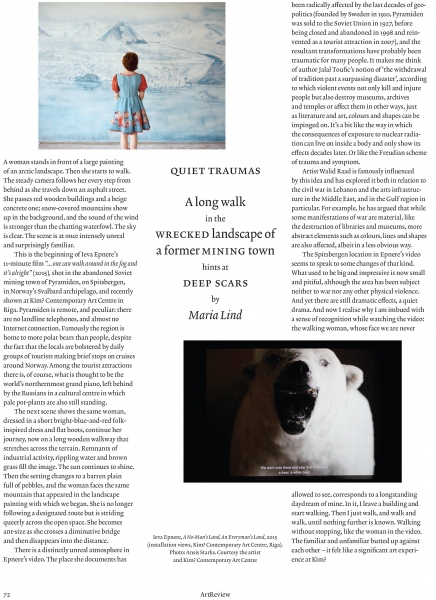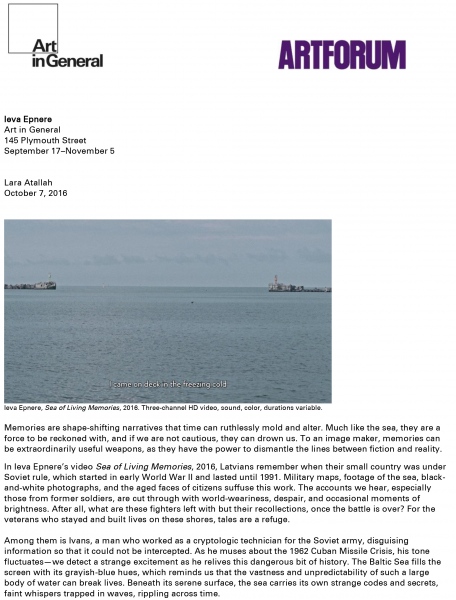-
-
-
-
E-motional trips by Ieva Epnere
http://echogonewrong.com/e-motional-trips-by-ieva-epnere/
text by Maija Rudovska
-
RENUNCIATION FROM THE WORLD.
https://moscowbiennale.syg.ma/renunciation-from-the-world
Ieva Epnere is a Latvian artist who is producing photo, video and installations that represent various aspects of Latvian life. Epnere’s film ‘Renunciation’, already shown in the Latvian pavilion of the Venice Biennale, is being screened at the 6th Moscow Biennale.
‘Renunciation’ is a 20 minute short film about a Catholic priest and his modest and lonely life, appropriate to his status.
The first scene shows a typical Baltic landscape: steel-coloured sea waters, dense fog and shore bushes being torn apart by wind. A lonely figure appears in this austere landscape.
One of the obvious artistic solutions is using these kinds of shots: intentionally picturesque, ideally framed with perfect geometry, like being directed by Andrey Zvyagintsev. There is similar mix of landscapes and close ups, similar silent brutality of nature, similar harsh Northern charm, familiar to the audiences of ‘The Return’ and ‘Leviathan’.
However the highly artistic picture is not the only thing that the audience is faced with: in the process of watching the film, one gets to discover his internal voyeur. This ‘peeping effect’ is achieved through the artist and her camera’s focus on hardly visible details: a heavily knitted sweater, narrow buttonholes of a shirt, a trembling pencil. This pencil, actually, belongs to the priest mentioned above who experiences the impossibility of art on a daily basis.
The priest is trying to draw. Then he is looking through the catalogue with the pictures of Baltic beauties, wearing a traditional outfit; a catalogue that reminds the one from any exhibition devoted, let’s say, to Latvian craft and national costume. An ordinary catalogue that is being read in the moment of leisure. An ordinary documentation of the daily life, but there’s something else there, something breaking through the shots, elusive feeling of concern. One may see that every gesture of the priest lets on his inner tension; and holding back this tension demands a lot of effort.
The priest lays down the ritual fabrics with golden patterns, he is putting them one on one, red velvet gives way to purple brocade. This process, in which pragmatic meaning remains unclear for the audience, seems to bring real enjoyment (tactile? visual?) to the priest. Layered fabrics become a metaphor for the complex structure of experience of our interaction with art — sensual, intellectual, even religious. Piousness has to be understood in terms of phenomenology: it is both the ritual of creation / admiration, and the enchantment by creation, i.e. an obsessive desire to see mystery and the inexplicable power in the latter. Being enchanted, feeling small and fragile in the face of something great and astonishing is a religious kind of experience usually described with the word ‘awe’. The priest is well aware that the fact of human’s creation in the image and likeness of Creator first and foremost means the said human’s ability to create. But in order to create, it is necessary to abandon one’s feeling of awe and humility that was once turned into readiness for eternal service. This is hardly possible within the institute of Catholic church.
In the film one sees the priest buttoning up his black soutane. Each button goes into the hole, and, despite his fingers trembling, the process comes to an end. Is such a serene completeness possible in art? Very unlikely. Art is about being concerned, it is eternal evolvement, continual movement away from the self. Impossibility of art is a still water in the lake that appears in the final scenes of Epnere’s film. It seems to remind of tranquility and moderation, of will and taming the passions. But renunciation here is not about suppression of the flesh and spirit, it is renunciation of the world; for the world is no different from art.
Text: Marina Simakova.
Ieva Epnere ©

